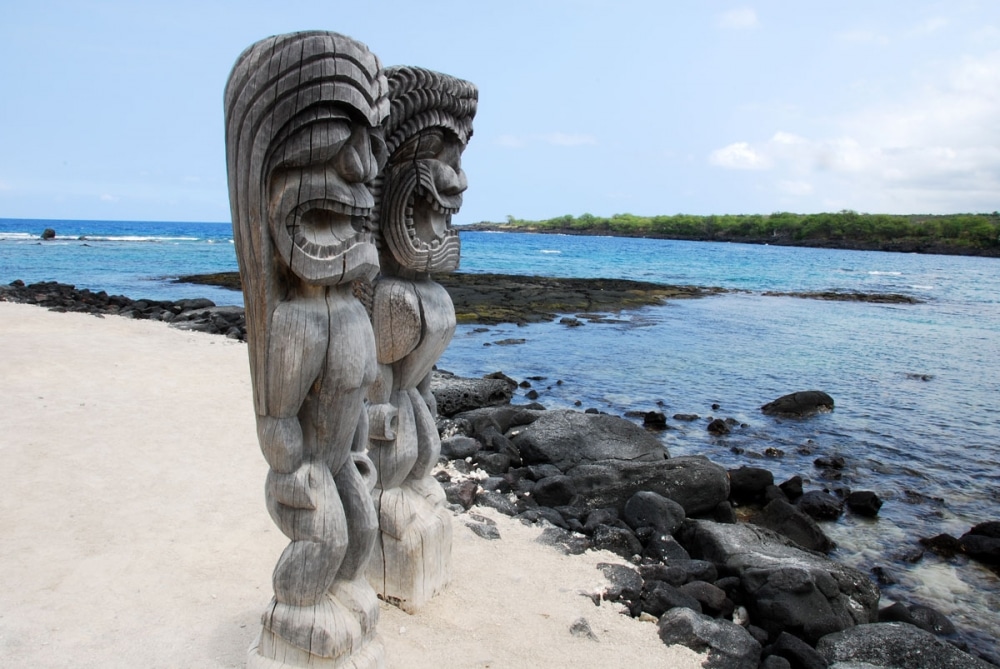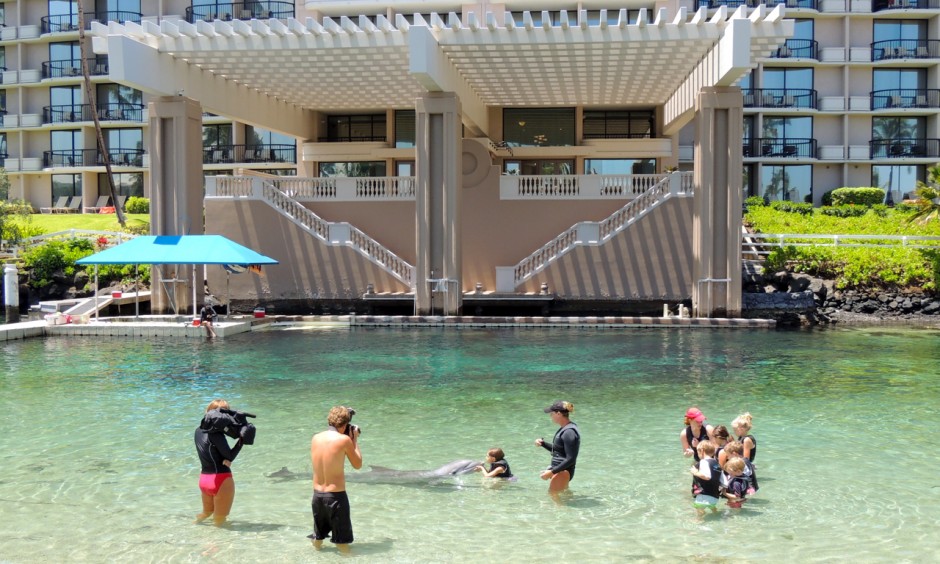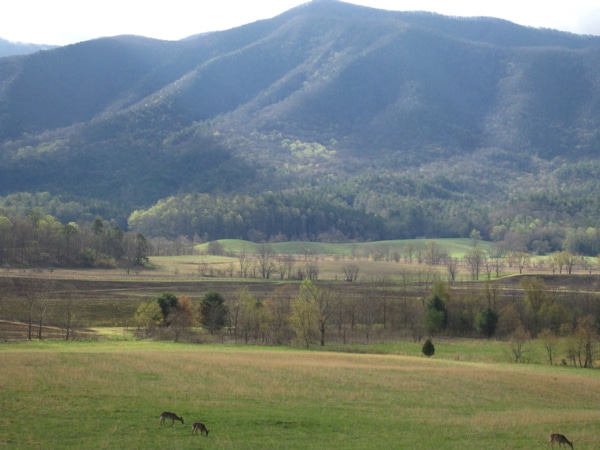In Austin we stayed at the Austen Motel, close to downtown. It is an old motor lodge on a large property, with attractive buildings, lots of colored tile, quirky artwork, and a lovely pool. It advertises itself a “So close, yet so far out.” (See www.austinmotel.com). The room we were assigned smelled very strongly of mold, and I complained. We stayed in that room one night and were moved to a nicer room, one with a hardwood floor (Room 144, the “Zen” room – ask for it!). We saw the manager about the first night and got a 10% discount, not enough but at least something. Remember, be aggressive at motels. Complain when you have to. Use a credit card like American Express. That way, you can protest to the credit card company if things are really bad. We’ve gotten an entire bill for one night removed by doing that.
The best thing about the motel was that it was close to a few streets of shops and restaurants and to the downtown. We could see the capitol from the sidewalk, a beautiful traditional capitol building, not far from the Colorado River (not the famous one but the Texas version; it is contained entirely within the state.) We took some walks and admired the stately old live oak trees, one of the city’s nicest features. We drove into town, to the area around the University of Texas. When we saw the tower atop the central building, I remembered the sniper, Charles Whitman, who gunned down so many people from the tower on August 1, 1966. A campus policeman pointed out the memorial area close by, and we went to read the plaque commemorating the innocent victims. I thought of all the ruined lives. And all the other snipers and serial killers who run amok in this most violent of countries.
Austen was our base for three nights. The day after we arrived, we drove eighty miles south to San Antonio for the first of four meetings with Texas nurses, who, with the leadership of the California Nurses Association’s National Nurses Organizing Committee, are trying to unionize the state’s nurses. It is very hard to organize in Texas and throughout the south. Nearly all states are “right to work” states, that is, states in which a union cannot negotiate any form of union security, such as one that demands that all members of the bargaining unit at least pay a “dues equivalent” to a union that represents them in collective bargaining. Such laws encourage “free riders,” workers who get any gains a union wins and must be fully represented by the union but neither have to join the union nor pay any dues. In addition, Texas does not have a law that guarantees public employees the right to organize and bargain with employers. So nurses in public hospitals cannot even force a representation election on the employer. The long and short of all this is that the union and the nurses have their work cut out for them.
We met the San Antonio nurses in a coffee shop near the city’s famous river walk (we strolled along it for an hour before the meeting. I enjoyed it and recommend it to visitors, especially the less-crowded and commercial parts. These latter are way too touristy for our tastes. There are some eye-pleasing buildings and trees along the walk). I spoke to about thirty nurses, many of them Hispanic (Latino and black workers are, in my view, key to any possible upsurge in the U.S. labor movement). We had a spirited discussion afterwards, and they bought a lot of books too. We heard what was to become a common litany of woes about the working conditions of nurses. These have become thoroughly degraded, as employers have done everything possible to extract maximum labor from the workers without rasing pay very much (see my article at http://mrzine.monthlyreview.org/yates280705.html for more details):
- nurses routinely work many consecutive shifts of twelve and even sixteen hours. This is dangerous for both nurses and patients.
- many new workers are not nearly as well trained as nurses once were, yet do jobs that really do require such training.
- patients are often subjected to treatment dangerous to them and against the wishes of the nurses
- hospital administrative is often slipshod and careless, sometimes jeopardizing patient health
- foreign nurses are recruited through special multi year visas, paid less than domestic nurses, and subject to dismissal and deportation if they stand up for themselves
- many nurses would not recommend a career in nursing tho their own children
- more than one nurse suggested that anyone who has to be hospitalized for a day or more should have someone with them at all times in the hospital. One nurse suggested that the patient lie and say that the companion was a nurse!
- physicians and other business persons are opening surgical clinics, offering quick treatment but without using adequate nursing or any nursing staff and without facilities to deal with complications. In Oklahoma City a nurse told us that these clinics are completely unregulated and are taking so much business away from real hospitals that, unlike in most of the nation, there is not a nursing shortage there.
Besides San Antonio, we visited nurses in Austin (at a small union office), Houston (in a nurse’s home), and in Dallas (at a restaurant in Arlington, about thirty miles from the city). These groups were smaller. The Austin group was nearly as spirited as that in San Antonio, but the ones in Houston and Dallas seemed less well organized. I was amazed in all cases that the nurses took time off from their hectic schedules to come hear me talk. I wish them all the best. It struck us again that the working life is a tale of woe for most workers, full of anxieties and fears. Our capacities are great, but our work lives diminish and insult our humanity.
Let me note in passing that I like the California Nurses Association (www.calnurse.org) very much. It is a militant rank-and-file union. The organizer who brought us tp Texas is a former United Electrical Workers (UE) organizer, and that says a lot right there. Under the aggressive leadership of president Rose Ann DeMoro, the CNA has built a strong and successful organization, willing to confront power, including California’s governor, with mass actions. CNA has come into conflict with Andrew Stern’s Service Employees International Union, and this is a pity. Stern should take lessons from CNA’s play book instead of beating the dead horse of labor-management cooperation and making nice with the CEO of Wal Mart. There is something wrong when a union with many healthcare members does not come out foursquare for national healthcare.
We were too busy to do much sightseeing in Houston or Dallas. But in Dallas we stayed at an interesting and comfortable hotel called the Hotel Indigo ( www.hotelindigo.com). It is in an historic building, the first one to bear the “Hilton” name, and it is on Main Street and within easy walking distance of the heart of downtown. When we had a couple of minor complaints about our original room, we were given a suite at no extra charge. And room rates are remarkably reasonable for downtown in a big city. We took a Friday free day and strolled around town, seeing the JFK assassination site for the first time. A few conspiracy nuts were hustling tourists. Although I felt bad for JFK’s family when he was murdered, I have never understood the cult-like status that this president has achieved. At the time of his election, he was a person of scant political accomplishment. As president he did little to move the nation in a positive direction. He was thoroughly conservative in all that mattered, and he nearly got us involved in a nuclear war over Cuba. His parents were scoundrels. He was a notorious philanderer, putting LBJ to shame. Of course I also have a low opinion of Jackie Kennedy too. Much ado about very little. To put any of the Kennedys in the same sentence as Martin Luther King is to slander that great man’s name. We finished our walk in Dallas by walking on another street back to our hotel, past the original Nieman Marcus store. I remembered the company’s mail order catalog with its extraordinarily lavish gifts. These days, with astounding wealth accumulating in the hands of a tiny minority, those gifts no doubt seem chintzy.
We had an amusing experience after I spoke with the nurses in Arlington. I had a radio interview scheduled with Judy Ancel, director of the Institute of Labor Studies at the University of Missouri-Kansas City ( http://www.umkc.edu/labor-ed/staff.htm). Judy has a show called Heartland Labor Forum on KKFI (90.1 FM). [I mention in passing that the Institute is on the university’s chopping block, and Judy is struggling to keep it alive. More and more schools have tried to get rid of labor studies programs. The means vary, but the message is clear – any university department or program not aligned with business interests or actively opposed to them faces trouble.] I had to find a land line to do the interview. The restaurant we met in with the nurses did not have one, but Karen found a nearby shopping mall so we thought we would have no problem. However, a manager in a Macy’s told us that her store had no pay phone and there were none in the mall. In fact, she said that she had not seen a pay phone in years! But she said we could use her phone. I asked if she meant a phone in a back office, and she said no, the phone right on the service desk counter. We said that we’d check other places out first and come back if we had to. We had to! I called the station from the counter phone and did the interview with customers milling around me. We thanked the manager profusely afterward. Not many people would do that for you.
We stopped in Oklahoma City the day we left Dallas (Saturday, July 21) to do a book signing at Full Circle Books in the northwest part of the city. We got a motel room located right on an interstate exit ramp, and it turned out to be one of the worst motels in which we have stayed. It was a Days Inn, but one definitely on the skids. Again families, seemed to be vacationing at the motel pool. Quite a few people appeared to be living at the motel. Men were hanging around drinking, and some looked pretty rough, so much so that we moved the car and parked it in the front by the office and under a light. The room was such a mess that we complained. The manager ended up giving us a $15 discount. The book signing wasn’t much better. A staff person showed us to a signing table, but neither she nor any of her coworkers made any conversation with us during the two hours we sat there. No one told any customers we were there. Thankfully a nice couple, she a nurse and he an artist, sat down an talked to us for over an hour, telling us a few things about the area, especially its lack of any progressive elements and the locals’ habit of trashing the roads with litter. Both bought a book, and the woman sent me a nice email the next day. I couldn’t wait to get out of the store, the motel, and the town. The one good thing, besides the couple, was a food store we found that stocked some organic food.
Our visit to the nation’s “heartland” took a turn for the better when we visited Wichita and Kansas City. The motel in Wichita, a Super 8 near the airport, was clean, comfortable, and cheap. We had lunch at the Anchor Bar and Grill downtown with some local labor people, organized by Jake Lowen, Director of the Wichita/Hutchinson Labor Federation of Central Kansas. We learned a few things about the area, including a recent union decertification at the large Boeing. The company then immediately made a few drastic changes in working conditions, including a sharp cut in health benefits. We also learned that there is still a lot of racial and ethnic segregation in Wichita, and that there is a rich labor history as well, with IWW organizing and mass jailings. Later after the talk I gave at Watermark Books (to an enthusiastic audience and gracious and interested staff), we were told that the Beats had a presence in Wichita. Allen Ginsberg even wrote a Wichita poem (Wichita Vortex Sutra, an epic poem of protest against the Vietnam War, see http://www.believermag.com/exclusives/?read=article_potts for details of the poem and Ginsberg’s visit to Kansas). Remember too that William Burroughs spent his final years in Lawrence, Kansas. The labor and beat information were given to us by an email friend of mine, Stuart Elliot, a gold mine of information about Kansas labor and its history (see http://newappeal.blogspot.com for more about Stuart and some photos of my bookstore appearance. See also http://www.unionvoice.org/kansas_workbeat). Stuart told us of lots of places to visit in Kansas next time we come here.
One of the most pleasant surprises of our book tour occurred in Kansas City, the next stop after Wichita. We got a motel a few miles from the city along the interstate, after discovering that the motels a bit closer were booked for the night. I was to speak at the campus of the University of Missouri-Kansas City. The sponsors were Judy Ancel’s Institute for Labor Studies and the Department of Economics’ Center for Full Employment and Price Stability ( http://www.cfeps.org). Economics professor Frederic Lee, whom I had the pleasure to meet and who also promoted the event, has helped make the university’s economics department a rare bastion of heterodox economics. He also publishes the useful “Heterodox Economics Newsletter” (www.heterodoxnews.com), a welcome breath of fresh air in the stultifying and oppressive atmosphere of mainstream economics.
Our evening began with a potluck dinner organized and largely prepared by several graduate students, all roommates, in their home. It was heartening to meet a couple of Professor Lee’s students and hear them talk knowledgeably about the world around them. One of them had been undergraduate at Evergreen College in Olympia, Washington. He was familiar with Orca Books, the store I visited there in early June and which is owned by the sister of John Bellamy Foster, editor of Monthly Review. He had done an undergraduate paper on the MR brand of economics and had read all the back issues. Another student was about to embark upon a year of study at the London School of Economics. Karen and I both noticed that the students had an excellent rapport with their professor and that Dr. Lee neither tried to dominate conversation nor play the role of bosom buddy. We were impressed.
Judy Ancel drove us to the college for the talk, showing us a few Kansas City sights along the way, including The Country Club Plaza, designed in 1922 as the nation’s first suburban shopping mall. Real estate magnate J.C. Nichols had the Plaza built. “Remembering his travel experiences in Europe and the Southwest, Nichols chose a Spanish theme for the Plaza that included beautiful courtyards and stucco buildings with red tile roofs and ornate towers. He hand-picked works of art to adorn the Plaza’s streets and sidewalks; antique sculptures, columns, tile-adorned murals, wrought iron and fountains were all meticulously placed by J.C. himself. And he designed The Plaza with the car in mind. There were eight filling stations in the early days. Garages and parking lots were ample. The Plaza became the first major shopping area in the country to be constructed to cater to people arriving by automobile.” ( http://www.countryclubplaza.com)
By 7:00 the meeting room was packed, more than sixty people, perhaps the largest crowd of the entire tour. A good mix of young and old, men and women, and black and white, listened attentively, asked a slew of questions, and bought a whole boxful of books. Afterwards I met a man I had known through correspondence for many years. His name is Fred Whitehead, a cultural activist, writer, and scholar (see http://www.fredwhitehead.com/). He once edited a cultural newsletter I subscribed to, and he promised to send me the last issues, which I had never gotten because we move around so much. Fred’s brave freethinking cost him a job at the University of Kansas Medical Center. He gave us a number of places to see when we got to Joplin, Missouri, once the center of the nation’s lead and zinc mining. Like Stuart Elliot, Fred is a wealth of information about the forgotten working class and radical history of places now mired in economic and ecological distress and much more conservative than their past indicates they should be.
We arrived in Joplin on Wednesday, July 25, ready for some rest and relaxation and another eye examination.






